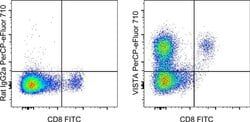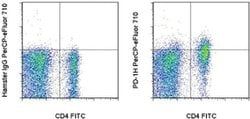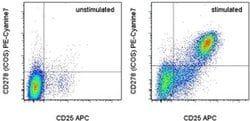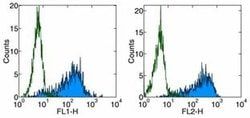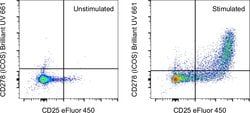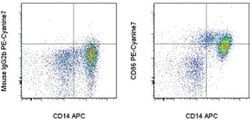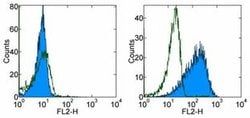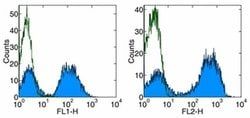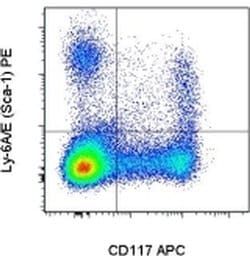B7-H4 Monoclonal Antibody (188), PE, eBioscience™, Invitrogen™
Manufacturer: Invitrogen
Select a Size
| Pack Size | SKU | Availability | Price |
|---|---|---|---|
| Each of 1 | 50-110-38-Each-of-1 | In Stock | ₹ 37,202.00 |
50-110-38 - Each of 1
In Stock
Quantity
1
Base Price: ₹ 37,202.00
GST (18%): ₹ 6,696.36
Total Price: ₹ 43,898.36
Antigen
B7-H4
Classification
Monoclonal
Concentration
0.2 mg/mL
Formulation
PBS with 0.09% sodium azide; pH 7.2
Gene Accession No.
Q7TSP5
Gene Symbols
Vtcn1
Purification Method
Affinity chromatography
Regulatory Status
RUO
Gene ID (Entrez)
242122
Content And Storage
4° C, store in dark, DO NOT FREEZE!
Form
Liquid
Applications
Flow Cytometry
Clone
188
Conjugate
PE
Gene
Vtcn1
Gene Alias
B7 family member, H4; B7 homolog 4; B7 superfamily member 1; B7h.5; B7H4; B7-H4; B7s1; B7x; BC032925; EMBL:AAH95842.1}; FLJ22418; immune costimulatory protein B7-H4; PRO1291; Protein B7S1; RGD1311204; RP11-229A19.4; t cell costimulatory molecule B7x; T-cell costimulatory molecule B7x; UNQ659/PRO1291; VCTN1; V-set domain containing T cell activation inhibitor 1; V-set domain containing T-cell activation inhibitor 1; V-set domain-containing T-cell activation inhibitor 1; Vtcn1; vtcn1 {ECO:0000312
Host Species
Rat
Quantity
100 μg
Primary or Secondary
Primary
Target Species
Mouse
Product Type
Antibody
Isotype
IgG2b κ
Description
- Description: The 188 monoclonal antibody was generated against and reacts with mouse B7-H4 also known as B7S1, B7X
- Cross reactivity of this antibody to other proteins has not been determined
- B7-H4 is a newly discovered member of the B7 family reported to inhibit T cell activation, cell cycle progression and IL-2 production
- The ligand for B7-H4 has not been identified yet
- Simultaneous double staining of cells with two anti-mouse B7-H4 antibodies, Clone 9 and 188, suggests that epitopes recognized by these mAbs are different and/or there is no steric hindrance when antibodies are used together
- 188 stains mouse B7-H4 transfected cells and not spleen cells
- Exact expression pattern of B7-H4 has not been fully characterized
- Applications Reported: The 188 antibody has been reported for use in flow cytometric analysis
- Applications Tested: The 188 antibody has been tested by flow cytometric analysis of transfected cells
- This can be used at less than or equal to 0.5 μg per test
- A test is defined as the amount (μg) of antibody that will stain a cell sample in a final volume of 100 μL
- Cell number should be determined empirically but can range from 10^5 to 10^8 cells/test
- It is recommended that the antibody be carefully titrated for optimal performance in the assay of interest
- Excitation: 488-561 nm; Emission: 578 nm; Laser: Blue Laser, Green Laser, Yellow-Green Laser
- Filtration: 0.2 μm post-manufacturing filtered
- B7-H4 (B7x, VTCN1) a costimulatory protein which is reported to function as a negative regulator of T-cell mediated immunity
- Although B7-H4 binds an unknown receptor, it is thought to deliver an inhibitory signal to T-cells preventing their proliferation, cell cycle progression and interleukin-2 production
- B7-H4 deficient mice are only minimally affected; suggesting B7-H4 is important in the fine tuning of the T-cell mediated immune response
- B7-H4 is expressed on activated T-cells, B-cells, monocytes and dendritic cells
- Aberrant expression has been associated with cancers of the lung, breast and ovary in humans
- B7-H4 is expressed primarily on the membrane of lymphoid cells, and as an immunoinhibitory protein that interacts with receptors on the surface of T lymphocytes, it is involved in mediating cellular and humoral immune responses
- Overexpression of B7-H4 is associated with certain malignancies, including ovarian and breast cancer, which may be a mechanism by which tumor cells suppress T cell immunity and facilitate tumor progression
- Further, VTCN1 may be a useful biomarker for the early detection of ovarian cancer and Renal Cell Carcinoma (RCC).
